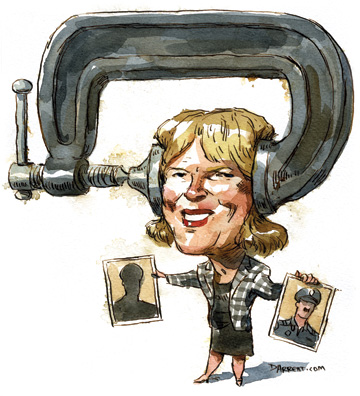Mary Suhm now faces the toughest task a Dallas city manager has, more daunting than budgets, potholes, layoffs, public works projects, or the bimonthly horseshoe interrogations. She has to hire a new police chief.
“This is it. For every community and constituency in Dallas, public safety is the most important thing,” Suhm says on an early Thursday morning in December, a few weeks after Chief David Kunkle announced he will step down in April. “If you don’t have a city government that can keep people safe and make them feel safe”—it’s a difference with distinction, and it’s telling she makes the point—“then nothing else a city does matters.”
Take Ted Benavides, for example. Suhm’s predecessor will be remembered most for his biggest failure: in August 1999 he hired the inept Terrell Bolton as police chief—without even interviewing him, much less conducting a national search. True, Benavides hired Kunkle, too, but some sins can never be forgiven, no matter the penance. Benavides’ resignation in 2004, the same year he hired Kunkle, owed to his own mediocre performance and racial politicking, but everyone agrees that Bolton was Benavides’ personal tipping point.
So, you know, no pressure.
Unlike Suhm’s job, which requires a majority of the City Council’s vote for hiring or termination, the city manager alone hires (and fires) the chief of police. But she could, if she chose, submit her pick to the Council for an informal vote of confidence. Would she?
“Oh, good God, no,” she says. “No.”
Not that she’s going totally alone. She’ll have spent December and January updating the criteria and process used in the 2003 search. “What’s the criteria? Everyone keeps asking me that. Obviously someone who keeps the momentum going,” she says.
Supporters say that Kunkle’s statistics-based cluster disruption strategies and neighborhood outreach, along with the 500 net additional police officers the force gained under his command, steadily drove down the overall crime rate from 2004 to 2008. But recently questions have been raised about whether the crime rate decline is just legerdemain. Dallas Morning News police reporters found that at least some of the heralded decline on Kunkle’s watch—“We now have only the second-worst crime rate in America!”—came from under-reporting everything from burglaries to violent assaults. But let’s not over-report the under-reporting. The old reporting method still would have showed that violent crime is down 19 percent during Kunkle’s tenure (compared to the inflated claim of 32 percent). That’s the momentum Suhm wants to continue.
Momentum is one consideration. Skin color is another. One day after news of Kunkle’s resignation broke, Councilman Tennell Atkins angrily told reporters that Suhm didn’t need to do a nationwide search; she needed to promote First Assistant Chief David Brown. (Atkins and Brown are black.) Atkins quipped that, after all, a nationwide search hadn’t been conducted when Suhm was hired—which isn’t true. Suhm says she knows race will be part of the conversation, but it won’t be part of her decision.
Other pols may have their own choices, but as of a few weeks after Kunkle’s announcement, they were playing it close to the vest. Even normally outspoken pols like Deputy Mayor Pro Tem Dwaine Caraway, whose voice carries extra weight since he’s chair of the council’s public safety commission and extra volume because he’s Dwaine Caraway, is mum. “I want the best person—he or she, Anglo, black, Hispanic, or other—from wherever in the nation,” he says.
Kunkle has made no secret of the fact that he thinks some of his top commanders are qualified and wants to see one take his place. “They wouldn’t be my [senior commanders] if I didn’t think they couldn’t handle this,” Kunkle says, and nothing more.
Since, as of this writing, Suhm had not established her hiring criteria, much less received a single application, it would be irresponsible to start talking about some likely local contenders. Let’s begin.
The names of Deputy Chief Vince Golbeck and Assistant Chief Floyd Simpson, in addition to Brown, have been bandied about—off the record—from Jack Evans Police HQ to Marilla Street. But none of the current command staff is a favorite of the largest of the four police associations, the Dallas Police Association. (No one’s talking at the black, Latino, or Fraternal Order.)
DPA president Senior Corporal Glenn White has long been down on Kunkle and, by extension, his assistant chiefs because of the rules restricting deadly force, high-speed chases, TASERs, the chokehold—White could go on and on. He even says he would like to have done a DPA membership “survey” (by which he means a vote of confidence, which is really only surveyed when there is none) on Kunkle before the chief resigned. White says he may now do a membership survey on the whole DPD command staff, to make the case for an outside hire.
“Kunkle’s senior commanders do too much politicking,” White says. “We want a chief who will run the department the way it should be run, absent pressures from City Hall. That’s why we’ve always backed giving the chief a five-year contract, like the LAPD chief. There are things we do to put people in jail that we can’t do now [and the current command staff supports the restrictions]. I’ve been here 32 years, and police work has changed significantly.”
On the national talent front, the International Association of Chiefs of Police, which may be tapped to help in Dallas’ search, can’t provide the names of likely candidates since they don’t have Dallas’ criteria. And, notes a headhunter at the Bethesda, Maryland-based Council of State Governments Justice Center, police chief hires for major cities are just as often lateral recruitments from other cities as they are upward moves from smaller city departments, anyway.
But there is this: two other comparable major cities, Houston and Atlanta, plus the smaller but high-profile city of Seattle are also in the top-cop head hunt. They are competing for the same talent, and we might encounter their ex-chiefs.
Houston, a strong-mayor city, invariably changes chiefs with new mayors, and they’ll have sworn in a new mayor by January. If—when—Houston Chief Harold Hurtt, 62, is job hunting in 2010, everyone remind Suhm that he ran up $24 million in overtime since his 2004 hire, and he once advocated surveillance cameras in private homes. Hurtt didn’t return calls to find out if he was interested.
Meanwhile, Atlanta Mayor Kasim Reed, who took office in January, appointed an interim chief after his election win, and plans to hire a permanent chief by April, just like Dallas. Thus Atlanta’s chief, Richard Pennington, is theoretically in play. He’s an Arkansan who topped the New Orleans cop shop, too. Seattle’s mayor-elect says he’ll restart a long-delayed search in January, too, which sort of puts Seattle’s interim chief, John Diaz, into play, after nearly a year heading Seattle PD.
Advantages for Dallas? Job security not tied to elections, a city with a history of supporting effective chiefs, and, as Suhm says, it’s Dallas. “I wouldn’t trust the judgment of someone who would consider Atlanta or Houston over Dallas, so it just makes my job easier,” she says.
If so, then that’s the only thing making her job easier.
Write to
[email protected]
.







